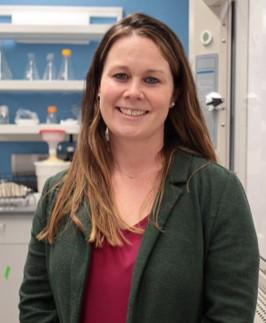

KL2 Scholar Kate Kyler, M.D., MSc, FAAP; Children's Mercy Kansas City
By Kelly Hale , Marketing & Communications Specialist
Sep 06, 2024
KL2 Scholar Kate Kyler, M.D., MSc, FAAP; Children's Mercy Kansas City
Project Title: Obesity's influence on systemic corticosteroid exposure and response in children with asthma
Project Summary: Dr. Kyler's KL2 project will investigate how obesity impacts systemic steroid processing (i.e., pharmacokinetics) and effect (i.e., pharmacodynamics) in children with asthma exacerbations. Her first study aims to use novel applications of single-cell sequencing to understand alterations to steroid response in inflammatory blood cells in children with obesity compared to those without obesity. Her second study will investigate pharmacokinetic differences in steroid processing by the body in children with obesity compared to those without obesity. Her long-term objective is to combine information from these investigations to create steroid dosing strategies tailored to children with obesity.
Mentors: Bridgette Jones, M.D.; Elin Grundberg, Ph.D.
Kate Kyler, M.D., MSc, FAAP, a pediatric hospitalist who recently completed a clinical pharmacology fellowship at Children's Mercy Kansas City, wants to help children with asthma and obesity by understanding how obesity impacts the effect of drugs when treating asthma. While there are guidelines on the amount of drugs to give most children, they don't account for children with obesity.
"The clinical pharmacology fellowship helped me set up my own research program focused on drug dosing and effect in children with asthma and obesity," Kyler said. "I'm excited to be able to focus my research on kids that I see every day when I'm working clinically."
For her KL2 project, Kyler wants to work on improving pharmacokinetic and pharmacodynamic knowledge for systemic steroids, which are medications that are commonly prescribed to treat asthma attacks in kids and adults.
"What I've found when I'm caring for kids coming into the hospital with asthma attacks is that a large proportion of them have obesity, about one in four," she said. "When you prescribe steroids or any drugs to children, doses are based on their weight. [In a prior study] I found it is variable how people address that weight factor [when prescribing drugs to] kids when they have obesity."
And are the recommended drug doses for kids with asthma attacks working well enough for the subset with obesity?
"What I want to do with my research is figure out what the right answer to that question is, so we can provide dosing recommendations for steroids for kids that have obesity and asthma when they come in," said Kyler.
As children with asthma and obesity have worse health outcomes related to their asthma compared to children without obesity, this research could improve health outcomes for kids with obesity by optimizing drug dosing and effects.
"I have two aims for my KL2 project; the first aim is pharmacodynamic, meaning what the drug does to the body, specifically looking at inflammation and how steroids affect inflammation in kids after they take a dose," she said. "The second aim is pharmacokinetic, meaning how our body processes the drug. And for this aim, we'll be looking at two groups of kids in the hospital with asthma – one with obesity and one without – and understanding if the concentration of steroids in their blood is different or if it is processed differently between the two groups."
For the KL2 program, Kyler is looking forward to having time and support to launch her research program as well as access to additional mentoring.
"I'm also looking forward to learning about more Frontiers offerings, like Team Science," said Kyler. "And learning how to lead a team in the lab effectively. Frontiers Scholars Club will be a great experience, allowing me to interact with and learn from scholars from different backgrounds and experiences."
As Kyler embarks on her KL2 project, she has started thinking about future collaborations through Frontiers that could positively impact the health of children with asthma and obesity.
Latest Articles
View All Funded Projects · News
Funded Projects · News
 TL1 Trainee · News
TL1 Trainee · News
 Funded Projects · News
Funded Projects · News
 TL1 Trainee · News
TL1 Trainee · News
 Funded Projects · News
Funded Projects · News
 TL1 Trainee · News
TL1 Trainee · News
 KL2 Scholar · News
KL2 Scholar · News
 Funded Projects · News
Funded Projects · News
 Funded Projects · News
Funded Projects · News
 TL1 Trainee · News
TL1 Trainee · News
 KL2 Scholar · News
KL2 Scholar · News
 Funded Projects · News
Funded Projects · News
 News
News
 TL1 Trainee · News
TL1 Trainee · News
 News
News
 News
News
 Funded Projects · News
Funded Projects · News
 TL1 Trainee · News
TL1 Trainee · News
 Events
Events
 TL1 Trainee · News
TL1 Trainee · News
 News
News
 TL1 Trainee · News
TL1 Trainee · News
 KL2 Scholar · News
KL2 Scholar · News
 News
News
 KL2 Scholar · News
KL2 Scholar · News
 Funded Projects · News
Funded Projects · News
 News
News
 TL1 Trainee · News
TL1 Trainee · News

 TL1 Trainee · News
TL1 Trainee · News
 Services · News
Services · News
 News
News
 Funded Projects · News
Funded Projects · News
 Funded Projects · News
Funded Projects · News
 Funded Projects · News
Funded Projects · News
 TL1 Trainee · News
TL1 Trainee · News
 KL2 Scholar · News
KL2 Scholar · News
 Funded Projects · News
Funded Projects · News
 News
News
 News
News
 News
News
 News
News
 News
News
 News
News
 News
News
 News
News
 News
News
 News
News
 News
News
 News
News
 News
News
 News
News
 Funded Projects · News
Funded Projects · News
 Funded Projects · News
Funded Projects · News
 KL2 Scholar · News
KL2 Scholar · News
 News
News
 News
News
 KL2 Scholar · News
KL2 Scholar · News
 KL2 Scholar
KL2 Scholar
 News
News
 News
News
 KL2 Scholar · News
KL2 Scholar · News
 News
News
 News · In the Community · Funded Projects
News · In the Community · Funded Projects
 Funded Projects · News
Funded Projects · News
 Funded Projects · News
Funded Projects · News
 Funded Projects · News
Funded Projects · News
 Funded Projects · News
Funded Projects · News
 News
News
 Funded Projects · News
Funded Projects · News

 TL1 Trainee · News
TL1 Trainee · News
 Funded Projects · News
Funded Projects · News
 Events · News
Events · News
 Funded Projects · News
Funded Projects · News

 Funded Projects · News
Funded Projects · News
 TL1 Trainee · News
TL1 Trainee · News
 News · In the Community · Funded Projects
News · In the Community · Funded Projects
 Funded Projects · News
Funded Projects · News
 KL2 Scholar · News
KL2 Scholar · News
 TL1 Trainee · News
TL1 Trainee · News
 News
News
 News
News
 KL2 Scholar · News
KL2 Scholar · News
 TL1 Trainee · News
TL1 Trainee · News
 News
News
 News
News
 Funded Projects · News
Funded Projects · News
 Events · News
Events · News

 KL2 Scholar · News
KL2 Scholar · News
 News
News

 Funded Projects · News
Funded Projects · News
 News
News
 Partner News · News
Partner News · News
 News · In the Community
News · In the Community

 0
0

 Funded Projects · News
Funded Projects · News
 Funded Projects · News
Funded Projects · News
 News
News
 Funded Projects · News
Funded Projects · News
 Funded Projects · News
Funded Projects · News
 News
News
 Events · News
Events · News
 TL1 Trainee · News
TL1 Trainee · News
 TL1 Trainee · News
TL1 Trainee · News
 News
News
 Funded Projects · News
Funded Projects · News
 News
News
 Partner News · News
Partner News · News
 TL1 Trainee · News
TL1 Trainee · News
 Events · News
Events · News
 KL2 Scholar · News
KL2 Scholar · News
 News
News
 TL1 Trainee · News
TL1 Trainee · News
 News · KL2 Scholar
News · KL2 Scholar

 TL1 Trainee · News
TL1 Trainee · News
 Events · News
Events · News
 News
News
 News
News


 News
News

 40
40

 News
News
 News
News
 TL1 Trainee · News
TL1 Trainee · News
 News
News
 Funded Projects · News
Funded Projects · News
 News · In the Community
News · In the Community
 Funded Projects · News
Funded Projects · News
 In the Community
In the Community
 News · In the Community · Partner News
News · In the Community · Partner News
 KL2 Scholar · News
KL2 Scholar · News
 News · In the Community
News · In the Community
 Events · News · Services
Events · News · Services
 Funded Projects · News
Funded Projects · News
 KL2 Scholar · Funded Projects · News
KL2 Scholar · Funded Projects · News
 TL1 Trainee · Funded Projects · News
TL1 Trainee · Funded Projects · News
 News
News
 News
News
 KL2 Scholar · Funded Projects
KL2 Scholar · Funded Projects
 KL2 Scholar · Funded Projects
KL2 Scholar · Funded Projects
 Events · News
Events · News
 News
News
 KL2 Scholar · Funded Projects
KL2 Scholar · Funded Projects
 News
News
 Funded Projects
Funded Projects

 TL1 Trainee
TL1 Trainee
 News
News
 Funded Projects
Funded Projects



